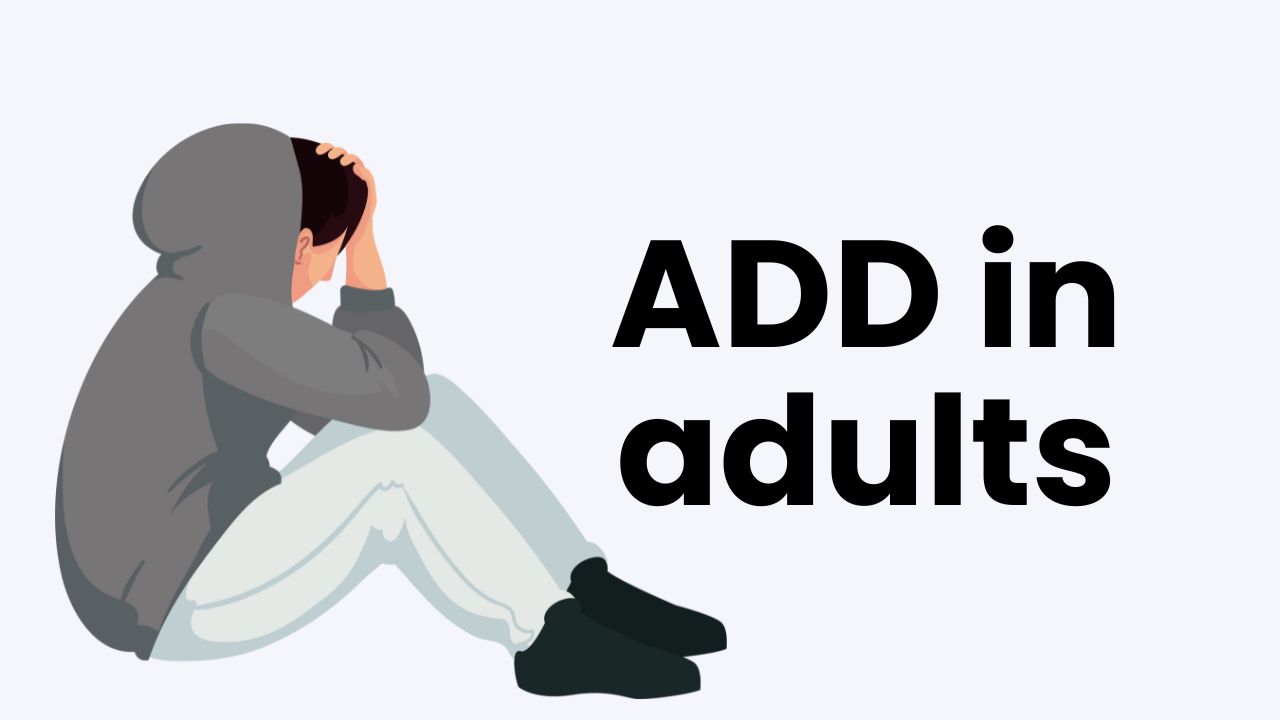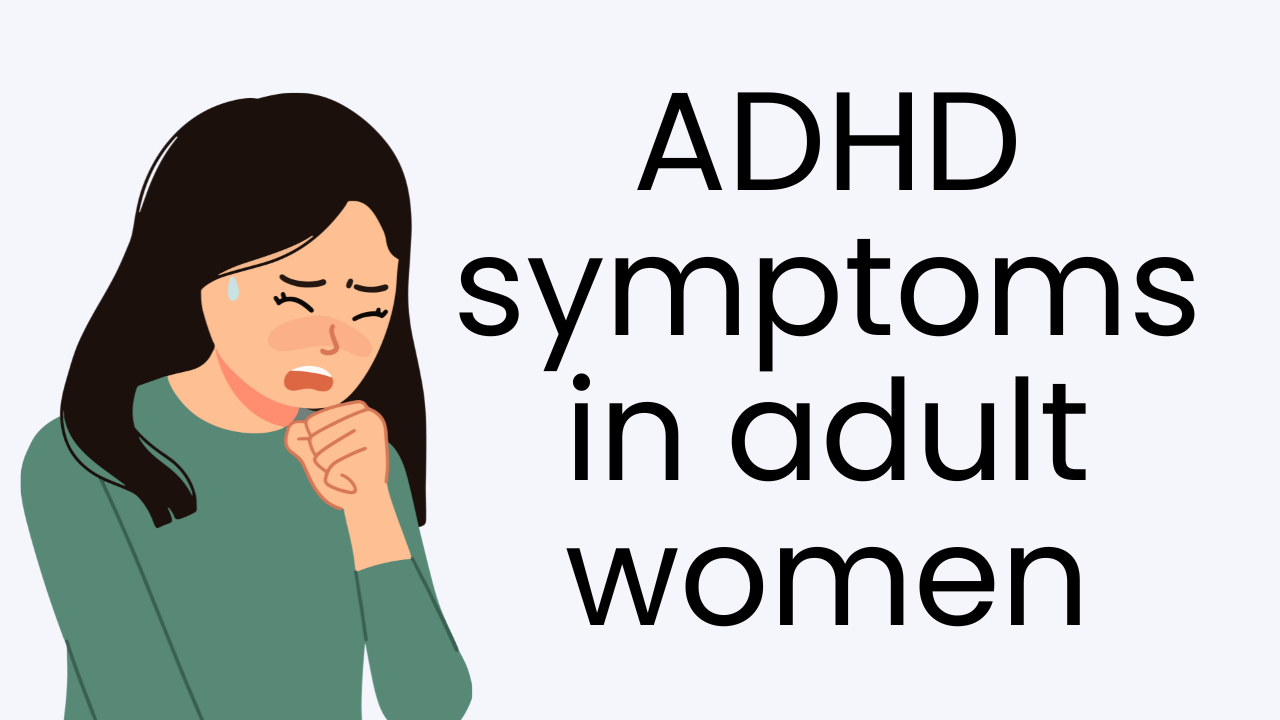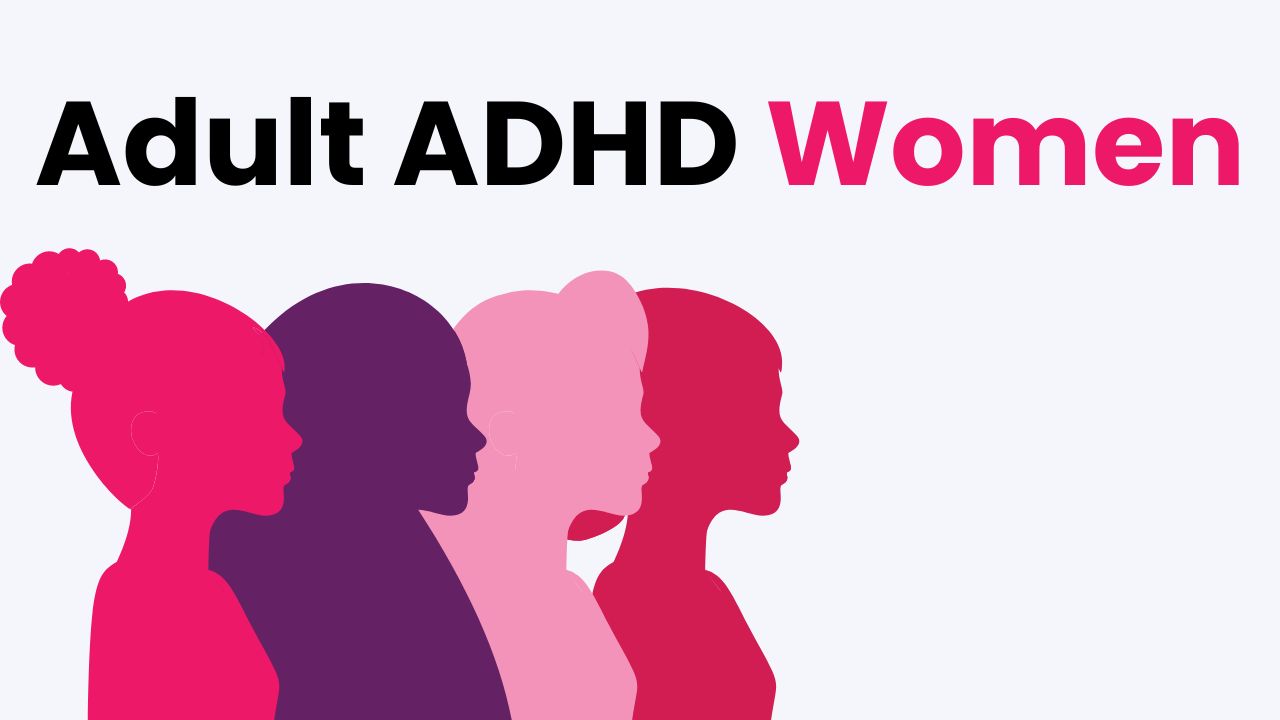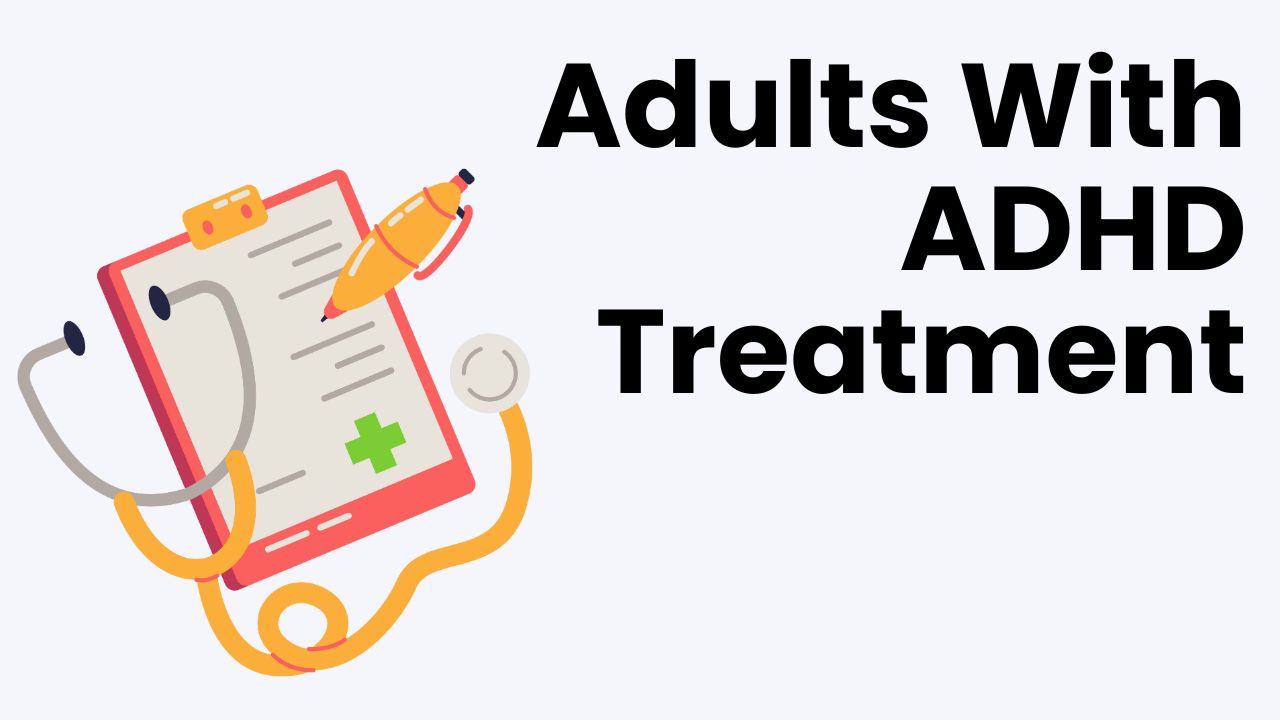ADD in Adults

In the realm of neurodevelopmental conditions, Attention Deficit Disorder (ADD) has long been overshadowed by its more widely recognized counterpart, Attention Deficit Hyperactivity Disorder (ADHD). However, ADD in adults is a significant reality that impacts countless individuals worldwide, often going unrecognized or misunderstood.
I aim to shed light on this complex condition, providing a comprehensive guide to understanding adult ADD, its symptoms, causes, and effective management strategies.
Understanding Adult ADD
Adult ADD, also known as Inattentive ADHD, is a subtype of ADHD characterized by persistent patterns of inattention, disorganization, and forgetfulness. Unlike the predominantly hyperactive-impulsive type of ADHD, individuals with adult ADD often struggle with sustaining focus, following through on tasks, and staying organized, without exhibiting significant hyperactive or impulsive behaviours.
The impact of ADD on adults can be far-reaching, affecting various aspects of life, including work, relationships, and daily functioning. It's crucial to understand that ADD is not a result of laziness, lack of intelligence, or poor motivation; rather, it is a neurobiological condition with underlying neurochemical and structural differences in the brain.
Symptoms of Adult ADD

The manifestation of ADD in adults can be diverse and multifaceted, with symptoms often varying in severity and presentation.
Some common signs and symptoms to watch for include:
- Inattention and Distractibility:
- Difficulty sustaining attention and focus on tasks, conversations, or activities
- Easily distracted by external stimuli or internal thoughts
- Struggling to follow through on instructions or complete tasks, often leaving them unfinished
- Forgetfulness and Disorganization:
- Frequently losing or misplacing important items, such as keys, wallets, or phones
- Difficulty with time management and meeting deadlines
- Struggling to maintain an organized living or work environment, with cluttered spaces and misplaced items
- Procrastination and Avoidance:
- Putting off tasks or responsibilities until the last minute, even when aware of the consequences
- Avoiding tasks that require sustained mental effort or are perceived as boring or challenging
- Restlessness and Impulsivity:
- Feeling fidgety or restless, even in calm situations
- Making impulsive decisions without fully considering potential consequences
- Interrupting others or blurting out responses before questions are fully asked
- Emotional Challenges:
- Low self-esteem and frequent self-criticism, often stemming from perceived failures or underachievement
- Mood swings and emotional dysregulation, with difficulties managing emotions
- Difficulty managing stress and anxiety, which can exacerbate existing symptoms
It's important to note that while these symptoms may be present in individuals with ADD, the severity and combination of symptoms can vary greatly, making each person's experience unique.
Causes and Risk Factors of Adult ADD

The exact causes of ADD are not yet fully understood, but research suggests a complex interplay of genetic, environmental, and developmental factors contributing to its manifestation. Here are some of the primary factors implicated in the development of ADD:
- Genetic Influences:
- ADD tends to run in families, indicating a strong genetic component
- Specific genes associated with dopamine and norepinephrine neurotransmitter systems have been linked to ADD
- Neurobiological Factors:
- Structural and functional differences in brain regions associated with attention, executive function, and impulse control
- Imbalances in neurotransmitters, such as dopamine and norepinephrine, which play crucial roles in attention and focus
- Environmental Influences:
- Exposure to toxins, such as lead or alcohol, during prenatal development
- Traumatic brain injuries or illnesses affecting brain development and function
- Chronic stress or emotional trauma during childhood
- Developmental Factors:
- Premature birth or low birth weight, which can impact brain development
- Disruptions in the formation of neural pathways related to attention and executive function
Diagnosis and Assessment

Diagnosing ADD in adults can be a multifaceted process, as symptoms may have been present since childhood but went unrecognized or were attributed to other factors.
A comprehensive assessment typically involves the following steps:
- Clinical Evaluation:
- Detailed interviews and questionnaires to gather information about symptoms, medical history, and functional impairments
- Assessing the onset, duration, and severity of symptoms, as well as their impact on daily life
- Psychological Testing:
- Assessments of cognitive abilities, attention span, and executive functioning
- Neuropsychological evaluations to identify potential deficits or strengths
- Ruling Out Other Conditions:
- Differential diagnosis to exclude other potential causes, such as mood disorders, anxiety, learning disabilities, or neurological conditions
- Addressing potential comorbidities, as ADD often co-occurs with other mental health conditions
- Collateral Information:
- Gathering information from partners, family members, or close friends about observed behaviors and impact on daily functioning
- Reviewing historical records, such as school reports or job evaluations, for patterns of inattention or underachievement
It's important to note that the diagnosis of ADD in adults is based on a comprehensive evaluation by qualified healthcare professionals, such as psychiatrists, psychologists, or neuropsychologists, who are trained to recognize the unique presentation of ADD in adulthood.
Management and Treatment Strategies

Effective management of ADD in adults typically involves a multifaceted approach combining various strategies tailored to individual needs and preferences. Here are some of the most widely recognized and effective treatment approaches:
- Medication:
- Stimulant medications, such as methylphenidate (Ritalin) and amphetamines (Adderall), are commonly prescribed to improve focus, attention, and concentration
- Non-stimulant medications, such as atomoxetine (Strattera) and guanfacine (Intuniv), may be used as alternatives or in combination with stimulants
- These medications work by increasing the availability of neurotransmitters like dopamine and norepinephrine in the brain, enhancing attention and focus
- Psychotherapy:
- Cognitive Behavioral Therapy (CBT) can help individuals develop coping strategies, challenge negative thought patterns, and improve emotional regulation
- Coaching and skills training can enhance time management, organization, and productivity skills
- Lifestyle Modifications:
- Regular exercise and physical activity have been shown to improve focus, attention, and overall well-being
- Maintaining a healthy diet rich in nutrients like omega-3 fatty acids, vitamins, and minerals can support brain health
- Ensuring adequate sleep and implementing good sleep hygiene practices can improve cognitive function and energy levels
- Environmental Accommodations:
- Creating a structured and organized living/work environment can reduce distractions and improve focus
- Using tools and strategies like noise-canceling headphones, timers, reminders, and productivity apps can enhance productivity and time management
- Supplementation:
- While not a substitute for medical treatment, certain supplements may provide complementary support:
- Omega-3 fatty acids, such as those found in fish oil or algae sources, can improve brain health and cognitive function
- Vitamins and minerals like vitamin D, iron, and zinc can address potential deficiencies that may contribute to cognitive impairments
- Herbal supplements like ginkgo biloba, rhodiola rosea, or bacopa monnieri have shown promising results in improving focus and concentration, although more research is needed
While not a substitute for medical treatment, certain supplements may provide complementary support:
Omega-3 fatty acids, such as those found in fish oil or algae sources, can improve brain health and cognitive function
Vitamins and minerals like vitamin D, iron, and zinc can address potential deficiencies that may contribute to cognitive impairments
Herbal supplements like ginkgo biloba, rhodiola rosea, or bacopa monnieri have shown promising results in improving focus and concentration, although more research is needed
It's crucial to work closely with healthcare professionals, such as psychiatrists, psychologists, or specialized ADD coaches, to develop a personalized treatment plan that addresses individual needs and preferences. Regular monitoring and adjustments may be necessary to achieve optimal symptom management.
Strategies for Living with Adult ADD

In addition to the management strategies mentioned above, individuals with ADD in adults can benefit from incorporating the following strategies into their daily lives to enhance their overall well-being and productivity:
- Develop Routines and Structure:
- Establish consistent routines for tasks like sleep, meals, and work to provide a sense of stability and predictability
- Break larger tasks into smaller, manageable steps to avoid feeling overwhelmed
- Use calendars, to-do lists, and reminders to stay organized and on track with responsibilities
- Minimize Distractions:
- Create a dedicated workspace with minimal clutter and noise to reduce external distractions
- Turn off notifications and limit access to distracting websites or apps during focused work periods.
- Use noise-canceling headphones or ambient background noise to improve concentration.
- Prioritize Self-Care:
- Practice stress management techniques like deep breathing, meditation, or yoga to promote relaxation and emotional regulation
- Engage in regular physical exercise to boost focus, mood, and overall well-being
- Seek support from friends, family, or support groups when needed to avoid feelings of isolation or burnout
- Leverage Technology and Tools:
- Utilize productivity apps, timers, and reminders to stay on track and manage time effectively
- Explore assistive technologies like speech-to-text software or noise-canceling headphones to accommodate individual needs
- Consider using organizational tools like digital calendars or task management apps to streamline daily routines
- Educate and Advocate:
- Learn about ADD and its impact on daily life to better understand and manage the condition
- Communicate your needs and accommodations with employers, educators, or loved ones to foster understanding and support
- Advocate for greater awareness and understanding of ADD in adults by sharing your experiences and promoting education
- Embracing Strengths and Interests:
- Identify and cultivate areas of natural strength and interest, as these can provide motivation and a sense of accomplishment
- Consider career paths or hobbies that align with your strengths and passions, as they may be more engaging and rewarding
- Building a Support Network:
- Surround yourself with understanding and supportive individuals who can provide encouragement and accountability
- Join online communities or local support groups to connect with others navigating similar challenges
- Consider working with an ADD coach or mentor who can provide personalized guidance and strategies
Addressing Challenges in Work and Relationships
Adult ADD can present unique challenges in both professional and personal spheres. In the workplace, individuals with ADD may struggle with maintaining focus, staying organized, and meeting deadlines. These difficulties can lead to increased stress, frustration, and even negative performance evaluations or job loss. Effective communication with employers about needed accommodations and strategies can help mitigate these challenges.

In personal relationships, the forgetfulness, impulsivity, and difficulty listening associated with adult ADD can strain interactions with partners, family members, and friends. Open and honest communication about the condition, as well as seeking support and understanding from loved ones, can help navigate these challenges and maintain healthy relationships.
It's important for individuals with adult ADD to recognize these potential obstacles and proactively implement coping mechanisms and support systems to address them effectively.
Dispelling Myths and Misconceptions
Despite increasing awareness and research, several myths and misconceptions surrounding adult ADD persist, which can perpetuate stigma and hinder understanding. One common misconception is that ADD is simply a lack of focus or laziness. In reality, ADD is a neurobiological condition characterized by genuine difficulties in attention, impulsivity, and hyperactivity, not a choice or character flaw.

Another myth is that only children can have ADD, when in fact, many individuals continue to experience symptoms into adulthood. Late-onset diagnosis is also possible, as some individuals may develop coping mechanisms earlier in life.
Furthermore, there is a misconception that medication for adult ADD turns individuals into "zombies" or alters their personality. However, when prescribed and monitored appropriately, medication can effectively manage symptoms and improve overall functioning without drastically changing an individual's core personality.
By dispelling these myths and promoting accurate information about adult ADD, we can foster greater understanding, reduce stigma, and create a more supportive environment for those living with this condition.
Building a Support System
Having a strong support system is crucial for adults living with ADD. The challenges and difficulties associated with managing the symptoms of ADD can be overwhelming at times. Support from friends, family, or support groups can provide understanding, empathy, and encouragement. Connecting with others who are going through similar experiences can help individuals feel less alone and more empowered to face their challenges.

In addition to emotional support, practical assistance can also be invaluable. Having someone who can help with organizing schedules, setting reminders, or providing accountability can greatly improve daily functioning. This could be a partner, a close friend, or even a professional coach specialized in supporting individuals with ADD.
Support systems should also include healthcare professionals such as therapists or psychiatrists who can provide guidance and treatment options tailored to the individual's needs. They can offer tools and strategies for managing symptoms and improving overall well-being.
By building a strong support system, adults living with ADD can find comfort, guidance, and practical assistance in navigating their daily lives more effectively.
Lifestyle Changes and Healthy Habits
Incorporating healthy lifestyle changes and habits can significantly improve the management of adult ADD symptoms. Regular exercise, such as aerobic activities or yoga, can help reduce restlessness and increase focus, while also providing an outlet for excess energy. Establishing a consistent sleep routine is crucial for cognitive function and overall well-being.

Maintaining a nutritious diet rich in omega-3 fatty acids, vitamins, and minerals can support brain health and improve concentration. On the other hand, limiting caffeine intake is recommended, as it can increase anxiety and disrupt sleep patterns.
In addition to these lifestyle changes, engaging in stress management techniques like deep breathing, meditation, or mindfulness practices can promote relaxation and emotional regulation, which are often challenging for individuals with ADD.
By prioritizing healthy habits and activities, adults with ADD can enhance their overall well-being and better manage their symptoms, leading to improved quality of life and greater success in various aspects of their personal and professional endeavours.
Conclusion and Resources
Living with an adult. ADD can be difficult, but it is a recognized disorder that necessitates understanding, support, and appropriate treatment measures. Individuals with attention deficit disorder can have productive lives by recognizing their symptoms and obtaining appropriate treatment. Medication, therapy, and lifestyle changes are all popular and effective treatments that can greatly improve symptoms and general functioning.
Adults with ADD must learn coping mechanisms and techniques to manage their symptoms, such as better organization, impulse control, and routines. Building a solid support system and practicing healthy habits can also help persons with ADD.
Dispelling myths about adult ADD is also critical to building a more inclusive and understanding culture. Promoting correct information and discussing the realities of living with ADD can assist to remove stigma and develop empathy for people who have previously been misunderstood or marginalized.
It is essential that you consult medical professionals, join support groups, and visit credible websites dedicated to providing accurate information and help on adult attention deficit disorder (ADD).
Remember that with the correct education, resources, and support system, adults with ADD can overcome the problems of their disease and reach their full potential, living lives of purpose, productivity, and fulfillment.
Take Charge of
Your Brain Health Today!
Shop Now!
Similar Articles:

ADHD Symptoms in Adult Women
Attention Deficit Hyperactivity Disorder (ADHD) is a neurodevelopmental condition that has...

Adult ADHD Women
Attention Deficit Hyperactivity Disorder (ADHD) is a neurodevelopmental condition that has...

Adults with ADHD Treatment
Attention Deficit Hyperactivity Disorder (ADHD) is a neurological condition that has long been associated...